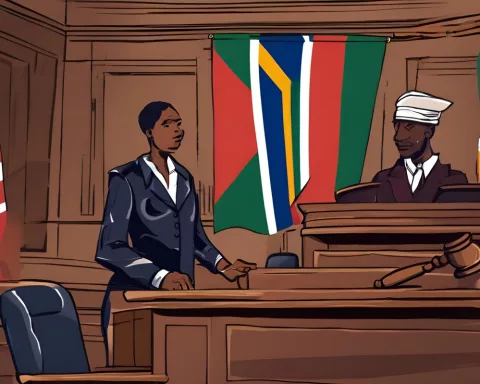The Senzo Meyiwa murder trial is a legal tug of war centered around the acceptance of alleged confessions by the defendants. The veracity of these confessions has been questioned, leading to debates on justice, human rights, and evidence acceptance. With Judge Mokgatlheng’s decision awaiting review, the pursuit of justice in Meyiwa’s case remains complex and filled with subtleties that question the crucial equilibrium between the determination to uncover truth and the protection of individual rights.
What is the Senzo Meyiwa murder trial about?
The Senzo Meyiwa murder trial revolves around the acceptance of alleged confessions by the defendants, accused 1 and accused 2. The veracity of these confessions has been questioned, giving rise to debates on justice, human rights, and evidence acceptance. With all these debates and startling disclosures, Judge Mokgatlheng’s decision, while substantial, can be reviewed later.
Disputed Confessions: The Heart of the Trial
The murder trial of Senzo Meyiwa primarily pivots around the legitimacy of alleged confessions by the defendants – Muzikawukhulelwa Sibiya and Bongani Ntanzi, referred to as accused 1 and accused 2 respectively. This internal trial, in progress since October 2023, revolves around the acceptance of these confessions at the [Gauteng High Court](https://capetown.today/the-ancs-legal-conundrum-a-r100m-debt-case-destined-for-the-constitutional-court/) in Pretoria. Presiding Judge Ratha Mokgatlheng’s scrutinizing oversight adds to the complexity of a case already heavily doused in public scrutiny.
Meyiwa, a celebrated goalkeeper, met a premature end on 26 October 2014 in Vosloorus, at his girlfriend and celebrated singer, Kelly Khumalo’s home. The prosecution argues that Ntanzi confessed his part in this sad event twice, initially to Colonel Moholo Raphadu at the Moroka Police Station in Soweto on 19 June 2020, followed by a second confession before Magistrate Vivienne Cronje at the Boksburg Magistrate Court on 24 June 2020. However, the veracity of these confessions has been questioned as the trial has advanced, giving rise to debates on justice, human rights, and evidence acceptance.
The Intricate Dance of Law: Questioning the Admissibility of Confessions
This complicated legal situation got more convoluted in October 2023, when Judge Mokgatlheng declared Ntanzi’s alleged confession, documented by Cronje, as unfit for court. State Prosecutor Advocate George Baloyi initially agreed with this judgement, but surprisingly changed his position, insisting on the recording’s relevance based on the best evidence principle. This principle, rooted in legal concepts, insists that the court should receive the highest quality of evidence to guarantee a just and precise verdict.
However, the defense attorneys have challenged this position, expressing concerns about the breach of Ntanzi’s rights. They assert that Ntanzi should have been informed about the recording and its potential use against him in court. They maintain that the fairness principle, as crucial to the justice system as the best evidence principle, has been disregarded.
Sibiya’s Story: A Different Narrative of Confession
Contrarily, accused 1, Sibiya, has his version of confession. He was reportedly detained on 30 May 2020 at Diepkloof Police Station in Soweto, where he purportedly admitted to his role in Meyiwa’s murder. Sibiya also pinpointed the crime scene in Vosloorus on 5 June 2020. However, the defense attorneys claim that the prosecution has not conclusively demonstrated that these confessions were given freely and voluntarily, a fundamental criterion for any confession to be accepted.
In an unexpected turn of events, Advocate Sipho Ramosepele made a shocking assertion about Sibiya’s treatment post-arrest. He claimed that Sibiya’s handcuffs were excessively tightened for over 8 hours, which they argue equates to torture. Ramosepele invoked international law from the United Nations to assert that extended use of handcuffs and similar restraints constitute a form of torture.
Awaiting Judgment: The Path to Justice
With all these debates, rebuttals, and startling disclosures now left for Judge Mokgatlheng to consider, he announced after the defense finished their closing arguments on Monday, 11 March, that his decision, while substantial, can be reviewed later. This revelation underscores that the legal quest for justice in Meyiwa’s case is far from concluding and is filled with subtleties that complicate the pursuit of justice.
As the story continues to unfold, the Senzo Meyiwa murder trial serves as a powerful reflection of the delicate balance between law and justice. It questions the crucial equilibrium between the determination to uncover truth and the protection of individual rights, even in the face of monstrous crimes. The final ruling, irrespective of what it might be, will undoubtedly leave a lasting impact on South Africa’s judicial framework.
1. What is the Senzo Meyiwa murder trial about?
The Senzo Meyiwa murder trial revolves around the acceptance of alleged confessions by the defendants, accused 1 and accused 2.
2. What is the best evidence principle?
The best evidence principle is a legal concept that insists that the court should receive the highest quality of evidence to guarantee a just and precise verdict.
3. Why was Ntanzi’s alleged confession declared unfit for court?
Judge Mokgatlheng declared Ntanzi’s alleged confession, documented by Cronje, as unfit for court due to concerns about the breach of Ntanzi’s rights.
4. What is the defense’s position on Sibiya’s confession?
The defense attorneys claim that the prosecution has not conclusively demonstrated that Sibiya’s confessions were given freely and voluntarily, which is a fundamental criterion for any confession to be accepted.
5. What is the significance of Judge Mokgatlheng’s decision?
While substantial, Judge Mokgatlheng’s decision can be reviewed later, indicating that the legal quest for justice in Meyiwa’s case is far from concluding.
6. What does the Senzo Meyiwa murder trial reflect about the South African judicial framework?
The Senzo Meyiwa murder trial serves as a powerful reflection of the delicate balance between law and justice, questioning the crucial equilibrium between the determination to uncover truth and the protection of individual rights, even in the face of monstrous crimes. The final ruling, irrespective of what it might be, will undoubtedly leave a lasting impact on South Africa’s judicial framework.












